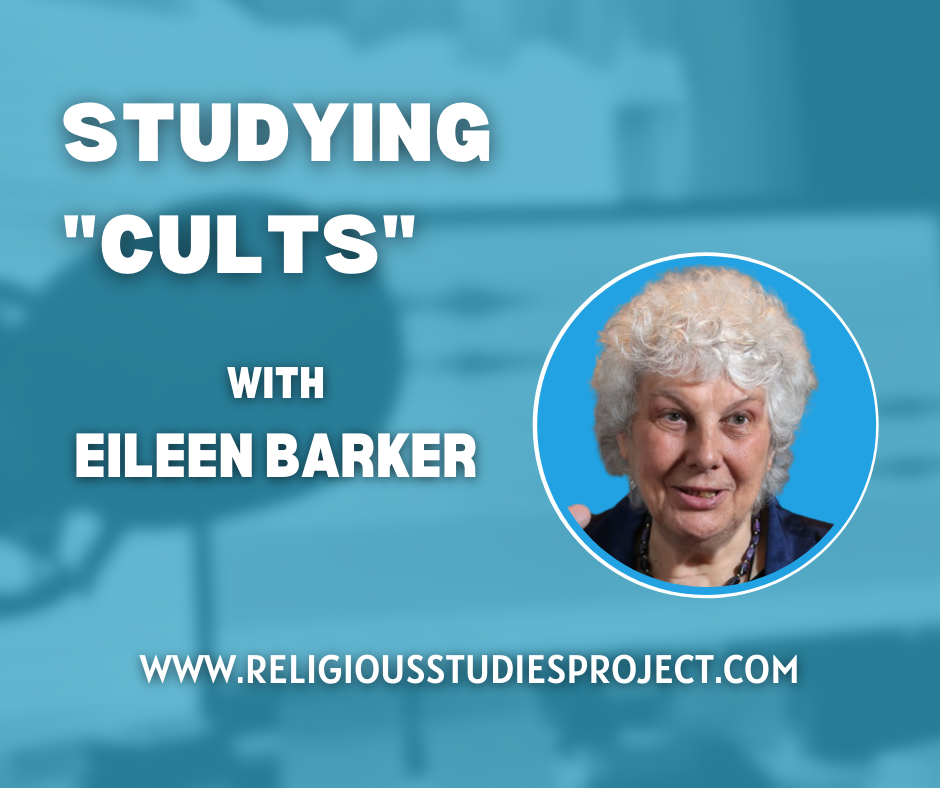Although “cult” and “sect” are used as technical terms in religious studies, in their popular usage, “cult” tends to refer to a New Religious Movement [NRM] or other group whose beliefs or practices are considered reprehensible. Since such pejorative attitudes are generally considered inappropriate for the academic study of religion, scholars have tended to adopt the nomenclature of NRMs to refer to “a wide range of groups and movements of alternative spirituality, the emergence of which is generally associated with the aftermath of the 1960s counter-culture” (Arweck 2002:269). In this interview with Chris, Emeritus Professor Eileen Barker (LSE) takes us through the academic study of NRMs from the 1960s onwards, engaging with the particular challenges and successes which have been encountered by academics in the field, and reflecting on some of the more colourful aspects of this area of research.
Eileen Barker OBE, FBA, is Emeritus Professor of Sociology with special reference to the study of Religion at the London School of Economics. She has been researching minority religions and the responses to which they give rise since the early 1970s. Her study of conversion to the Unification Church for her PhD, led to an interest in a wide variety of movements, and she has personally studied, to greater or lesser degree, over 150 different groups. She has over 300 publications, translated into 27 languages. She travels extensively for research purposes, particularly in North America, Europe and Japan, and, since collapse of the Berlin Wall, in Eastern Europe and, more recently, China. She was the first non-American to be elected President of the Society for the Scientific Study of Religion.
She is also the founder of INFORM (Information Network, Focus on Religious Movements), an independent charity that was founded in 1988 with the support of the British Home Office and the mainstream Churches. It is based at the London School of Economics. According to Inform’s website, “the primary aim of Inform is to help people by providing them with information that is as accurate, balanced, and up-to-date as possible about alternative religious, spiritual and esoteric movements.”
Among Professor Barker’s publications, the following may be of interest (those which are open-access are indicated with an asterisk):
- (2011) “The Cult as a Social Problem” in Religion and Social Problems, Titus Hjelm (ed.), New York & London: Routledge, 198-212.
- (2010) “Misconceptions of the Religious “Other”: The Importance for Human Rights of Objective and Balanced Knowledge”, International Journal for the Study of New Religions, Vol. 1 No. 1: 5-25.
- (2009) “In God’s Name: Practicing Unconditional Love to the Death” in Dying for Faith: Religiously Motivated Violence in the Contemporary World, Madawi Al-Rasheed and Marat Shterin (eds.), London: I.B. Tauris: 49-58.
- (2009) “New and Nonconventional Religious Movements: Implications for Social Harmony” The Review of Faith & International Affairs, Washington DC, Fall, 7/3: 3-10.
- Barker, E., ed. (2008) The Centrality of Religion in Social Life: Essays in Honour of James A. Beckford. Aldershot: Ashgate.
- *Barker, E., (2006) ‘What should we do about the Cults? Policies, Information and the Perspective of INFORM’, in The New Religious Question: State Regulation or State Interference? (La nouvelle question religieuse: Régulation ou ingérence de l’État?), P. Côté and T.J. Gunn, Editors. Peter Lang: Brussels. p. 371-395.
- Barker, E. and M. Warburg, eds. (1998) New Religions and New Religiosity. Aarhus: Aarhus University Press.
- *Barker, E. (1995) “The Scientific Study of Religion? You Must be Joking!” Journal for the Scientific Study of Religion 34(3): 287-310. Reprinted in Lorne L. Dawson (ed.) Cults in Context: Readings in the Study of New Religious Movements, Piscataway, NJ: Transaction, 1998: 5-28; and in The ‘Cult’ Controversy: A Reader (RST2255), edited by The University of South Africa. Muckleneuk, Pretoria: University of South Africa, 2009: 1-24. Available at: http://dialogueireland.files.wordpress.com/2010/05/barkerpaper1995ocr.pdf.
- Barker, E. (1989) New Religious Movements: A Practical Introduction. London: HMSO.
- Barker, E. (1984) The Making of a Moonie: Choice or Brainwashing?Oxford: Blackwell. Now available from Aldershot: Ashgate








